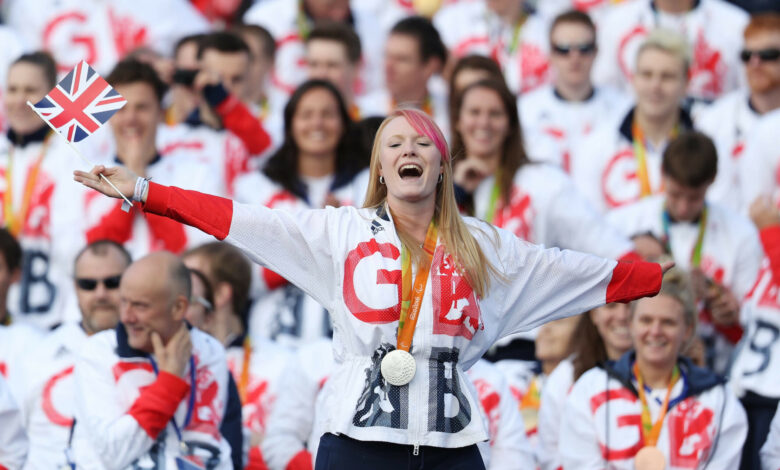Jodie Grinham, the archer aiming for a Paralympic medal at 28 weeks pregnant

“My team have joked a few times that my waters might break on the podium,” says archer Jodie Grinham, who will compete for Great Britain at this month’s Paralympic Games. “That would be a big deal.”
Grinham, speaking to The Athletics via video call from her training camp in St-Germain-en-Laye, west of Paris, will be seven months pregnant when she shoots her first arrow in the compound archery competition at Les Invalides on Thursday. She believes she will be the first Paralympic athlete to compete at such a late stage in her pregnancy.
“I will have accomplished something that no one else can say they’ve done,” Grinham says. “I (will) have been to a Paralympics when I was seven months pregnant and competed.
“(But) I don’t do it for a statement, I do it for me. If that’s enough for people to say, ‘Why can’t we do it?’ then that’s fantastic.”
Already a mother to Christian, due in October 2022, Grinham has been juggling caring for her toddler with training at home, while managing the side effects of pregnancy. The 31-year-old has adapted her training and technique in a bid to return to the podium after winning a silver medal with John Stubbs at the 2016 Paralympics in Rio de Janeiro, Brazil, in the mixed team compound, a category for athletes with “lower levels of disability in the upper or lower limbs”, according to the British Paralympic Association.
Grinham has “no fingers and half a thumb” and explains that “my arms are different lengths, my shoulder is underdeveloped through my left side that goes through to my left core and left hip” due to a congenital condition, brachysyndactyly. She and her partner, Christopher, have also suffered three miscarriages and she knows all too well how precarious and expensive pregnancy is.
“We decided we weren’t going to let the Games stop us from expanding our family,” Grinham says. “We didn’t even know if we were going to be able to conceive another one. We might never be able to. Getting pregnant isn’t as easy as people think. It’s not that simple.”
When Grinham was 28 weeks pregnant with her son Christian, they went into preterm labor.
“I was really sick during my pregnancy and it got worse,” she says. “When I was 16 weeks pregnant, I was on bed rest. After Christian was born, he was in an incubator, with severe jaundice, and almost needed a blood transfusion. I didn’t really get to hold him for the first 10 days, he was under a small light in a small cupboard, which was heartbreaking.”
This time, doctors weren’t sure Grinham’s left side would be able to support the weight of her baby and believed that part of the difficulty in carrying a pregnancy to term was due to the tendency of her left side to collapse. “We’re in the same position this time,” she says. “We don’t know.”
It’s entirely possible that the archer will give birth in Paris, so Grinham and her team have been researching the nearest maternity wards and hospitals, what happens if the baby is born in France, and the logistics of birth certificates.
“We have every back-up plan you can think of,” she says, even musing on the possibility of having the baby and returning to compete in the individual event at the Paralympics. “We’ll see,” she smiles.
Grinham’s appearance, however, is just as cheerful as her pink hair.

Grinham talks to The Athletics Charlotte Harpur
“When we sadly lost our last bride earlier this year, my partner said, ‘You’ve always wanted to do this, just do it,’” she says of her fuchsia locks.
“I knew that I might not even go to these Games if I had the same problems as I had during my previous pregnancy. I decided that I want a family and a career, I want to be able to do both.
“If it doesn’t happen medically, it doesn’t happen. I have the luxury of going to Los Angeles (2028 Olympics) and Brisbane (2032). I may never have the chance to have a baby again. I’m not going to regret a single kick or a single bad arrow. I’m going to be here and be the happy athlete mom that I know I deserve to be.”
More about the sporty summer in Paris…
“I’m a lot more front-heavy with the baby, so my balance is a little off with the swinging,” says Grinham, who had to change her shooting technique. “It was the weirdest workout I’ve ever done in my life. But it was fun.”
Adjustments have also been made to her bow’s stabilisers (weights on the bow to make it more stable) to help the Paralympic athlete feel strong and grounded through her feet. She is grateful for the “out-of-the-box thinking” of coach Charlotte Burgess, a mother and former Olympic archer, the British Paralympic Association and Archery GB for their support.
Grinham has to wear bulkier clothing to cover her stomach, but that leaves excess material around her shoulders that can get caught in the string. She now tucks a protector under her armpit to collect loose material. She’s moved the strap for her quiver (the holder that holds the arrows) to a lower position, which affects how she lifts the bow and holds it at her side, and she’s used video analysis to make sure nothing is interfering with her shot.

Grinham and John Stubbs compete in Rio (Yasuyoshi Chiba/AFP via Getty Images)
As her pregnancy progresses, however, her training continues to change. Last week, Grinham noticed that her baby was shifting lower in her pelvis, causing discomfort as the socket pulled. Lying on her back on the physio bed, Grinham can tilt her pelvis to gently encourage her baby to move so it’s not sitting so low — but she can’t do this during a race.
“If it works, great. If it doesn’t, I’ll just keep doing it,” she says matter-of-factly.
Grinham and Burgess have also devised “pregnancy prep sessions.” For example, during practice when Grinham is in the full pull position (ready to shoot), her coach encourages a gentle movement to mimic kicking a baby or tickles her side to simulate a flutter sensation.
But as Grinham watches the 32-inch goal from 50 yards out under intense pressure, with one decisive shot that could make the difference between a medal or not, her baby might decide to interfere.
“I felt a really good kick right before I shot and I just thought, ‘It’s okay, mommy knows you’re there,'” she says. “I’m not annoyed or upset. They don’t know what’s going on.
“I made this decision. If I go to the Games and I’m in the gold medal final and the baby kicks me and I lose the gold medal, what then? What did I expect? I knew the risks.”
Grinham doesn’t experience the “terrible” cravings she did when she was pregnant with her son, but her sense of smell has increased. Even the faintest smell makes her nauseous. Her body also craves snacks, little and often, as opposed to three meals a day. She’ll have to work harder to manage heat and hydration, and with the pressure of the baby on her bladder, she’ll have to go to the bathroom more often.
Grinham’s midwife and consultant team advised her from a pregnancy perspective and her sports medicine team from an athlete perspective, but like in many sports, there are no athlete pregnancy specialists. She recalls how doctors advised her not to train when she was carrying Christian, but that her sports medicine team would know best. However, her sports team were concerned about pushing her if the doctor advised her not to train. It was very difficult for Grinham to make the right decision.
“It would always be good to have a specialist who knows both,” she says. “But (so far) we’ve never needed them. It’s only very recently that athletes are being accepted as pregnant or as mothers. I hope that more pregnant women will see that they can continue to train and compete.”
Grinham’s partner Christopher — in her words, “the most understanding man in the world” — and her son Christian will not be in Paris, but will be watching from home, a decision made only a few weeks ago. Although they have had trial runs with Christian, watching his mother compete in domestic winter competitions, it has become more difficult as the toddler becomes more expressive.
“He doesn’t really understand that if he sees Mummy, he can’t have Mummy,” Grinham says. “He gets really upset. You can’t explain to a one-year-old that you can’t see Mummy because she’s at work. I can’t just sit in the middle of filming and comfort him.
“It’s hard. I’m programmed to listen to a baby cry. I have my athlete hat on, but I’m also a mother. It’s really hard to keep my mind off of that. Right now, it’s just easier to be here in athlete mode.”
Grinham knows that Christian is home and that she can video chat with her family whenever she wants, so she can fully focus on her work.
“I believe I can win a medal, pregnancy aside,” she says. “I’m shooting the best I’ve ever shot. I feel more experienced than ever. I want to win a medal.
“If I competed and had a happy, healthy baby in November, that would be success enough. I got what I wanted from these Games and the pregnancy. I’m here, I get to have fun, and I get a prize at the end, whether it’s a medal — but I’m getting a baby, and that’s what I want.”
(Top photo: Grinham in October 2016. Dan Kitwood/Getty Images)




